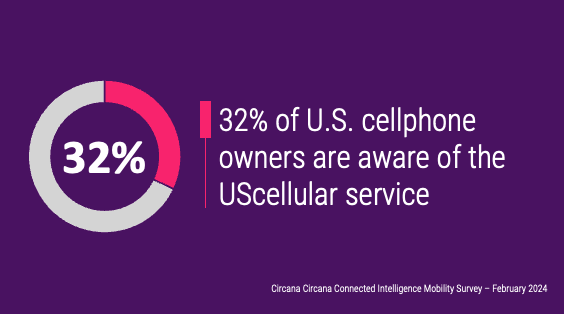
T-Mobile acquires UScellular
T-Mobile last week announced that it has agreed to purchase some of UScellular's wireless operations for $4.4 billion. The deal includes the purchase of around 30% of UScellular’s spectrum assets as well as its 4.5 million customer base. UScellular will maintain the remaining spectrum assets as well as its cellular towers, which will be leased by T-Mobile. The transaction, involving both cash and assumed debt, is expected to close by mid-2025 pending regulatory approvals.
The Circana Take:
- Almost a year ago, we reported on Telephone & Data Systems (TDS - the major shareholder of UScellular)’s intention to explore "strategic alternatives" given the challenge that UScellular’s regional operations lacked the necessary scale to remain independent. At the time, the carrier had 4.7 million customers running on its network, but has since lost 200K subscribers. TDS/UScellular’s exit timing is strategic as it is poised to lose more subscribers to competition. However, the company still needs to ensure the churn does not grow significantly as up to $100 million of the cash portion of the deal is based on certain financial and operational metrics delivered until the official approval of the agreement.
- When TDS expressed its desire to sell the business back in August 2023, we commented that UScellular is an aged (network equipment wise) end-to-end regional network operator with ownership of all network-related assets including the network towers, which the potential buyers (the big three) prefer to lease rather than own. T-Mobile, indeed, cherry picked the pieces that will complement its current operations and the spectrum assets acquired will help T-Mobile further boost its low- and mid-band coverage in rural areas.
- With this acquisition, T-Mobile will add another 4.5 million customers, 90% of which are higher ARPU postpaid customers, to its already massive base. The $4.4 billion price tag may initially look high considering that rival Verizon paid $7 billion for Tracfone’s 20 million prepaid subscribers (two million of which have already migrated to other services since the acquisition). However, it is important to remember that T-Mobile will take over 90%+ postpaid base that is not only more loyal but also more lucrative than the elusive base Verizon acquired from Tracfone. UScellular’s postpaid ARPU lingers around $52/month versus a roughly $20 ARPU brought in by Tracfone prepaid customers at the time of the acquisition. And, of course, T-Mobile is also gaining significant spectrum assets, while the Tracfone acquisition did not.
- The magnitude of this acquisition is nothing compared to the Sprint merger completed four years ago and, given T-Mobile’s integration experience, the network and customer transition should be quite smooth. However, this will be the third acquisition T-Mobile will have under its belt in the last four or five years, and getting the FCC approval in a highly consolidated market may not be as easy. Nevertheless, cable MVNOs’ growing presence should help T-Mobile’s case as consumers still have four to five major service operators to choose from.